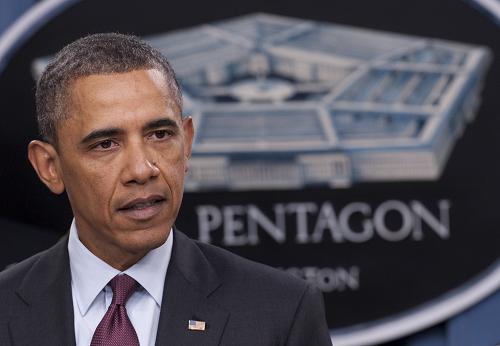US to increase military presence in Asia-Pacific
 0 Comment(s)
0 Comment(s) Print
Print E-mail
China.org.cn, January 6, 2012
E-mail
China.org.cn, January 6, 2012
U.S. President Barack Obama unveiled a defense strategy on Thursday to strengthen the country's military presence in the Asia-Pacific region despite fiscal constraints.
Obama made the remarks as the U.S. shrinks the overall size of the force and the Pentagon seeks to slash spending by nearly half a trillion dollars after a decade of war.
He said the U.S. will be "strengthening its presence in the Asia-Pacific and budget reductions will not come at the expense of this critical region."
"We're going to continue investing in our critical partnerships and alliances, including NATO ... We're going to stay vigilant, especially in the Middle East," he added.
Both Secretary of Defense Leon Panetta and Chairman of the Joint Chiefs of Staff Martin Dempsey accompanied with him during his rare presidential visit to the Pentagon.
The Defense Strategic Review, ordered by the president, will reset defense priorities and guide more than 450 billion dollars in defense budget cuts over the next decade. The Pentagon receives over 600 billion dollars annually for baseline budget and war- fighting expenses.
The U.S. military should be able to ensure national security with smaller conventional ground forces, Obama said. He vowed to get rid of "outdated Cold War-era systems" while investing in the capabilities needed for the future, including intelligence, surveillance and reconnaissance, as well as counterterrorism.
"Our military will be leaner, but ... agile, flexible and ready for the full range of contingencies and threats," he said.
Despite fiscal challenges, the defense spending will continue to grow, but at a slower pace, the president said.
"Over the past ten years, since 9/11, our defense budget grew at an extraordinary pace," he said. "Over the next ten years, the growth in the defense budget will slow, but the fact of the matter is this -- it will still grow."
The president again urged U.S. lawmakers to do the deficit- reduction job in accordance with the Budget Control Act passed by Congress last year.
A bipartisan congressional panel had failed to come up with a deficit-reduction plan, mandated by the legislation, which might trigger across-the-board spending cuts including defense spending.






